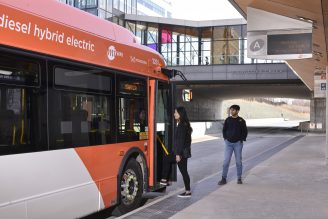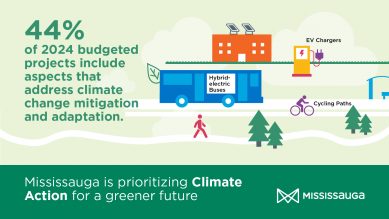Making climate change a priority for Mississauga: Taking meaningful steps now for a greener future
Environment | December 11, 2023
Climate change isn’t going away. It is a reality for every country, every level of government, every city and every individual worldwide. The UN has declared that the Earth is entering “global boiling.” This is where temperatures will continue to rise, and severe weather events will happen more frequently. At this point, global temperatures have risen past the point where they can be reversed. However, climate change can still be slowed down. We can work towards preventing additional greenhouse gas (GHG) emissions from entering our atmosphere as well as adapt to these warmer climate and everything that comes with it.
This means investing more money into meaningful actions and measures that will help us as a city. This includes reducing GHG emissions, making sure we can manage our stormwater and having enough greenspaces to be able to absorb more water during heavy rain and snow storms.
Why is this happening?
Generating power, manufacturing goods, using transportation, producing food and powering buildings all add GHG emissions into our atmosphere. This creates a heat blanket, trapping the sun’s heat. This slowly warms our planet and causes weather pattern to change, leading to extreme storms, droughts, plant and animal loss, crop failures and more.

What does this mean for you in Mississauga?
According to the Canadian Climate Institute, the economic damages caused by climate change will not be limited to some distant future. In fact, by 2025, the effects of climate change over the past decade will have reduced the national GDP of Canada by $25 billion. This means that if global warming had stabilized in 2015, the Canadian economy would have been $25 billion larger.
By the year 2100, the impact of climate change in Ontario’s cities is expected to result in billions of dollars in additional costs to the property tax bill. The cost of maintaining public infrastructure in Ontario could also increase by over $4 billion per year for the remainder of the century according to a report from the Financial Accountability Office of Ontario. The report mentioned that cities can cut costs by proactively making hospitals, schools, stormwater pipes and other public infrastructure more resilient to extreme heat and rainfall.
It’s difficult to think you can make a difference when it comes to combating climate change on your own – but you can. And so can the City. That’s why we’re taking actions to make our city greener and adapting to climate change.
By understanding the choices we make, we can have a positive impact on our environment, whether it’s choosing to bike, buy electric appliances, install heat pumps or solar panels or reducing waste.
We must start somewhere.
How will this impact you?
Each of us has the power to turn things around with the choices we make to reduce our carbon footprint. Making informed choices about our impact on the climate is more important now than ever before. Actions you take now can have a lasting impact on future generations – including your children, grandchildren and great-grandchildren.
What are we doing about it?
In 2019, City Council declared a climate emergency and adopted the Climate Change Action Plan, committing to becoming one of Canada’s first net-zero cities. The City has an aspirational goal of making Mississauga net-zero.
Next year, 44 per cent of budgeted projects in 2024 include aspects of climate change mitigation and adaptation. Climate-related projects, including hybrid buses, park acquisitions, electric-vehicle charging stations, bike lanes, sidewalks, buildings with solar panels, and more. That’s almost $263 million in capital spending that will help fast track our goal of achieving net zero.
The City is returning to its growth plan for transit post-pandemic, investing in the service to support population growth throughout the City, meeting our Climate Change goals, and to meet higher demand now that ridership has recovered from the impacts of the pandemic.

Actions taken in 2023
Lowering emissions
- Replaced more than 50 per cent of the MiWay bus fleet with second generation hybrid buses. These buses results in a 30 per cent reduction in diesel fuel consumption per year and 5,134,000 kilograms of avoided GHG emissions per year.
- Installed more than 70 electric vehicle (EV) chargers for the City’s fleet and more than 20 for public use. This has resulted in 130,000 litres of avoided gasoline consumption and 288,000 kilograms of avoided GHG emissions since 2021. The City will be investing another $500,000 in new EV chargers in 2024.
- Acquired the City’s first electric fire truck. Fire Station 125 (6627 Tenth Line) located in Ward 9 is scheduled to open in late summer 2024, and will be the new home of the City’s first electric fire truck but it will also be the City’s first net zero energy fire station. Going forward, all new fire stations will be built to net zero energy.
- Updating the Green Development Standard. By 2030, most new private buildings will no longer emit GHG emissions.
- The City is continuing to advance new low-carbon building technologies, such as heat pumps and heat recovery systems in City-owned buildings.
Increasing resilience
- Developed a Sustainable Neighbourhood Action Plan (SNAP) in the Cooksville area to help make Cooksville Creek and the surrounding neighbourhood more sustainable and ready for a changing climate.
- Continuing to offer a community gardens program, in partnership with Ecosource, to enhance local food security. A number of enhancements were made to existing gardens in 2022-2023, with at least two new community gardens planned for 2024-2025. This will allow more access to locally grown, healthy and culturally appropriate food.
- Approved the City’s first Stormwater Master Plan, Build Beautiful. The long-term plan will be used to refine the City’s stormwater program, stormwater management systems and infrastructure.
- Since 2020, the City has acquired 94.7 acres of parkland to enhance resilience and address the parkland deficit.
- Launched the Mississauga Climate Leaders Program to engage businesses in climate action, linking economic development with climate change.
Moving forward together
We’re actively working with different levels of government, corporations, non-profit organizations, community partners and residents like you to collaborate on actions. These investments will lead to cleaner air, less traffic and overall healthier neighbourhoods.

When we choose to support these types of investments, we’re making a strong commitment to continue to build a more sustainable and prosperous future for everyone – not just for ourselves, but future generations. By taking action today, we can help ensure a better tomorrow.
Learn more about the City’s Climate Change Action Plan and its progress by visiting: mississauga.ca/projects-and-strategies/city-projects/climate-change-action-plan.
Tags
Media contact
City of Mississauga Media Relations
media@mississauga.ca
905-615-3200, ext. 5232
TTY: 905-896-5151
